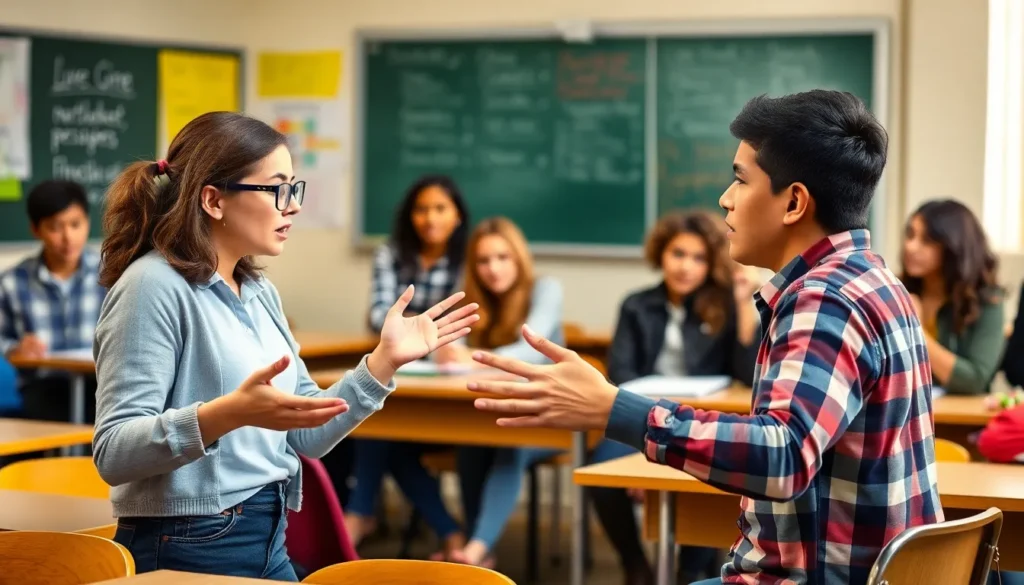Table of Contents
ToggleHigh school debates offer students a unique platform to hone their critical thinking and public speaking skills. Engaging in spirited discussions on various topics, students learn to articulate their viewpoints while considering opposing arguments. This dynamic environment fosters a sense of confidence and prepares them for future challenges.
Beyond just competition, high school debates encourage teamwork and collaboration. Students often work in pairs or teams, developing strategies and researching their topics together. This collaborative effort not only enhances their knowledge but also builds lasting friendships. As they navigate the complexities of debate, they cultivate essential life skills that extend far beyond the classroom.
Understanding High School Debates
High school debates provide a structured platform for students to engage in discussions on various topics. These debates enhance critical thinking, public speaking, and teamwork.
Definition of High School Debates
High school debates involve formal discussions where students represent opposing viewpoints on specific issues. Each participant or team presents arguments, rebuttals, and counterarguments based on research and preparation. Debates often follow specific formats, such as Lincoln-Douglas, Policy, or Parliamentary, each with unique rules and structures. This structured approach allows students to focus on logic, evidence, and persuasive communication.
Importance in Education
High school debates play a crucial role in education for several reasons:
- Critical Thinking Development: Debates challenge students to analyze issues, assess evidence, and develop coherent arguments. This fosters higher-order thinking skills crucial for academic success.
- Public Speaking Enhancement: Regular participation in debates builds confidence in public speaking. Students learn to articulate thoughts clearly and respond effectively under pressure.
- Teamwork and Collaboration: Debating in teams instills a sense of collaboration. Students work together to research topics, formulate strategies, and practice speeches, strengthening their social skills.
- Exposure to Diverse Viewpoints: Engaging with opposing arguments broadens students’ perspectives. It encourages respect for differing opinions and the ability to engage in constructive dialogue.
- Preparation for Future Challenges: Skills gained through high school debates, such as critical analysis and persuasive communication, prepare students for future academic and professional challenges. These capabilities remain valuable in diverse career paths.
Types of High School Debates

High school debates take various forms, each with distinct rules and objectives that shape the experience for participants. Understanding these types enhances students’ preparation and strategic thinking.
Lincoln-Douglas Debate
Lincoln-Douglas debate centers on values and moral philosophy. Typically involving two participants, one supports the resolution while the other opposes it. Debaters present and critique arguments regarding ethical issues, aiming for personal and societal values. Format includes one-on-one debates, with 13-minute speeches and cross-examinations, promoting persuasive speaking and logical reasoning.
Policy Debate
Policy debate focuses on specific policy proposals and their implications. Comprising two teams of two members each, participants advocate for or against a plan of action. The format allows in-depth exploration of evidence, statistics, and case studies, with an emphasis on problem-solving and solutions. Each round features constructive speeches, rebuttals, and a summary, fostering teamwork and critical analysis of policy issues.
Public Forum Debate
Public forum debate emphasizes topics relevant to everyday citizens. This format includes two teams of two, discussing current events or social issues. Debaters present arguments in a way that’s accessible, engaging, and understandable to a general audience. Each debate consists of crossfire, where participants directly engage with one another, enhancing vital communication and quick-thinking skills. The focus remains on clarity and effectiveness in argumentation, making debates informative and persuasive.
Benefits of Participating in High School Debates
High school debates offer numerous advantages that significantly contribute to students’ personal and academic growth. These include the development of critical thinking skills, improvement in public speaking abilities, and fostering civic engagement.
Development of Critical Thinking Skills
Involvement in high school debates promotes critical thinking by requiring students to analyze complex issues. Students must evaluate evidence, assess different perspectives, and construct coherent arguments. Participation challenges them to question assumptions and think logically. Engaging in debates enhances their ability to make informed decisions and form well-reasoned conclusions, skills that prove beneficial in academic settings and beyond.
Improvement in Public Speaking Abilities
High school debates provide invaluable opportunities to enhance public speaking abilities. Students regularly practice articulating thoughts clearly and persuasively in front of an audience. This practice builds confidence and comfort when addressing groups. Techniques learned through debates, such as effective voice modulation, body language, and the use of rhetorical devices, contribute to strong communication skills essential for academic presentations and future professional environments.
Fostering Civic Engagement
Participation in debates fosters civic engagement by emphasizing the importance of understanding societal issues. Students become more informed about current affairs and learn to appreciate various viewpoints. This exposure encourages active participation in civic discourse and motivates them to contribute to their communities. Debating issues relevant to society cultivates a sense of responsibility and empowerment, preparing students to engage meaningfully in democratic processes.
Challenges Faced by Debaters
Debaters face various challenges that can impact their performance and overall experience. Key issues include time management and access to resources.
Time Management
Time management poses a significant challenge for debaters. Preparing arguments, conducting research, and practicing delivery requires efficient scheduling. Many students juggle multiple commitments, such as academics, extracurricular activities, and personal responsibilities. Without a structured approach to prioritize tasks, it’s easy for debaters to feel overwhelmed. Allocating specific time blocks for preparation and practice ensures that debaters can maximize their effectiveness without sacrificing other obligations.
Access to Resources
Access to resources can also hinder debaters’ preparation and success. Not all students have equal access to materials, such as books, databases, or coaching. Limited access to quality research tools can impact the depth and breadth of their arguments. Furthermore, students in underfunded schools may lack opportunities for workshops or mentorship programs, which can provide valuable guidance in honing debate skills. Seeking out online resources and leveraging libraries can help bridge these gaps, allowing students to enhance their capabilities and perform confidently.
High school debates serve as a powerful tool for student development. They cultivate essential skills like critical thinking and public speaking while promoting teamwork and collaboration. Through structured formats, students learn to navigate complex issues and articulate their viewpoints effectively.
The challenges faced in debate preparation, such as time management and resource access, can be overcome with dedication and strategic planning. By engaging in these discussions, students not only enhance their academic abilities but also prepare for future career paths.
Ultimately, high school debates empower students to become informed citizens who appreciate diverse perspectives and contribute positively to their communities. The experiences gained in this arena are invaluable, shaping well-rounded individuals ready to tackle the world.





